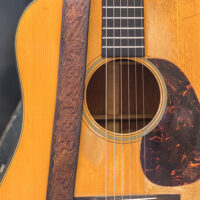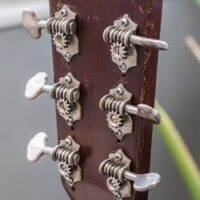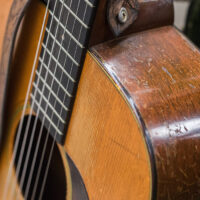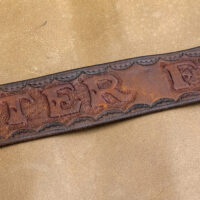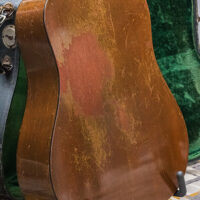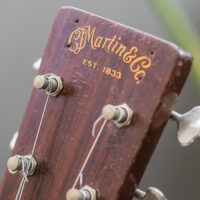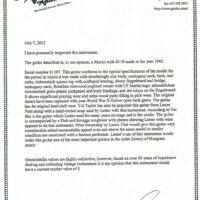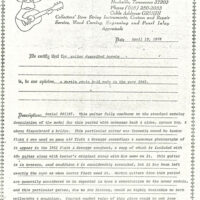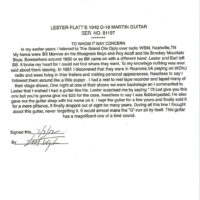
Readers so enjoyed our feature last week on Earl Scruggs’ D-18 Martin guitar, that we thought we would post this report from Matthew Tessier and Alan W. Tompkins about Lester Flatt’s earlier model D-18. It was recently published on the Bluegrass Heritage Foundation website, and they have offered to share it with our readers as well.
Several guitar players have made their mark in the history of bluegrass music since the 1950s, including Doc Watson, Norman Blake, Jimmy Martin, Clarence White, Tony Rice, and Kenny Smith, but many still consider Lester Flatt to be the “founding father” of bluegrass guitar. Flatt was the guitarist for Bill Monroe when Earl Scruggs joined the band in 1945. This was the core of the group that took the stage at the Grand Ole Opry in December 1945, and lit the spark for the genre that came to be known as bluegrass music.
According to Lester’s close friend and GRAMMY-winning musician Robert “Tut” Taylor Sr., Flatt didn’t own a pro-grade guitar suitable for stage use when he joined Monroe’s band, so Monroe loaned Flatt his Martin D-28 to use for a few shows. Lester’s strumming style left a few marks on Monroe’s guitar, so Bill soon told Lester, “you need your own guitar. Go buy yourself a Martin!” Flatt went searching in pawn and second-hand shops until he located a suitable Martin D-18, which he purchased.
In April 2023, shortly before the annual Bluegrass Heritage Festival, the Foundation was contacted by Scott Pilgrim, a close friend of the owner of the D-18 that Flatt bought that day. Pilgrim explained that the owner lived in San Antonio, had received the guitar from his father about ten years ago, and wanted to bring it to the festival so that bluegrass fans could see and hear the guitar again after its decades-long absence from public view. He said the owner had a file of documents and authentication on the guitar, including appraisals from George Gruhn dating back to 1978. Since part of the mission of the Bluegrass Heritage Foundation is to preserve and promote the heritage of bluegrass music, we couldn’t resist the opportunity!
Flatt’s 1942 Martin D-18 (#81197) is one of the most widely-heard instruments in bluegrass music because of its use on most recordings made by Flatt & Scruggs and the Foggy Mountain Boys throughout the 1950s. While many might assume that Lester used his (later-acquired) famous 1950 Martin “L-5” D-28 (which was donated to the Country Music Hall of Fame by Marty Stuart in 2008), Taylor reported that Lester preferred the sound of the D-18 for recording. Lester used the D-18 in early episodes of The Flatt and Scruggs Grand Ole Opry Show, but was asked by the producers to use a “nicer shinier” guitar when taping the shows. This led to his more frequent use of the “L-5” D-28, although the D-18 was still seen in several episodes of the Flatt & Scruggs show (see Vol. 7, 31:00, You Can Feel It In Your Soul). This D-18 is also seen in a wide assortment of Flatt & Scruggs promotional materials.
Part of the authentication for the guitar that was displayed at the Bluegrass Heritage Festival was a letter from Tut Taylor, who was also one of the founders of the GTR guitar shop in Nashville (a predecessor to the current Gruhn Guitar Shop). Pilgrim and the D-18’s current owner met with Taylor in 2012 to record his recollections about the history of this guitar. Taylor told them all the stories about Lester’s purchase and use of the guitar, and even wrote a letter documenting its history (a copy is in the photo gallery below).
Taylor explained that he became a great fan of Flatt & Scruggs in the late 1940s. He lost track of them after they split with Monroe, but later located them in Roanoke, Virginia where they were playing radio shows on WDBJ. Taylor became friends with the men and helped out frequently as a stagehand on their shows. Taylor said that that he often told Lester that he really wanted to have a guitar as good as his, and eventually Lester grew tired of hearing about it. Taylor wrote that “one night at one of their shows we were backstage and I commented . . . that I wished I had a guitar like his. Lester surprised me by saying, ‘I’ll just give you this one but you’re gonna give me $25 for the case!” Taylor gladly paid and became the owner of the guitar (and case!), and Lester even threw in the hand-tooled strap bearing his name. Taylor kept the guitar until he fell on hard times in 1969 and sold the guitar “for a mere pittance.”
The buyer was Dan Jones, a Texas musician who kept the guitar for about a decade until he sold it to another Texas guitarist in 1979. That buyer was the father of the current owner, who now lives in San Antonio. The owner said his father bought the guitar, brought it home, and put it in a closet – rarely taking it out – where it remained for nearly 40 years. Fortunately, the current owner’s son is a respected Texas guitar luthier who helps maintain the guitar, and keep it in excellent playing condition.
The display at the 2023 Bluegrass Heritage Festival included the guitar (sporting the well-placed wood putty that Lester used to repair the pick wear in the top) and its original ($25) case (with functional leather-string locking system!). Copies of the authentication and appraisal write-ups from George Gruhn, prepared in 1978 and 2012, are in our photo gallery below.
The response to this guitar from the Bluegrass Heritage Festival crowd can best be described as jaw-dropping. Dozens lined up throughout the day to see and photograph the guitar and strap up close, and several notable musicians (including C.J. Lewandowski, Rick Faris, and Greg Cahill) got the opportunity to hold, inspect, and strum the guitar. The sound was as amazing as you would expect from a beautifully designed, aged, and heavily-played vintage Martin, and smiles grew wide when players struck that famous G-run!
We sincerely appreciate the generosity and the effort made by the guitar’s owner, his son, and Scott Pilgrim to allow bluegrass music fans of all ages to spend a few minutes with this historic guitar, which could arguably claim the title of the “First Guitar of Bluegrass Music!”
PLEASE NOTE: As you might expect, we must include the appropriate disclaimers. Neither the Bluegrass Heritage Foundation nor the authors have done an independent investigation regarding the history of this guitar and cannot guarantee the accuracy of the information presented above. However, we inspected the guitar and its supporting documentation, and we have no reason to doubt the that the guitar is the instrument described above.
All photos by Nate Dalzell.
